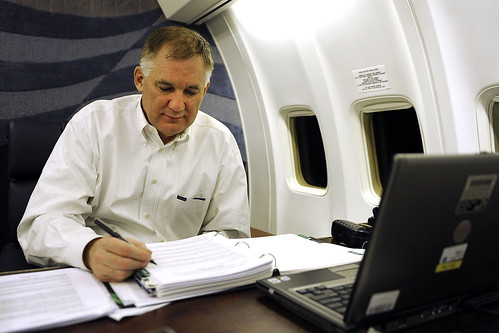Energy is essential to the way we live. Whether it is in the form of oil, gasoline or electricity, the worlds' prosperity and welfare depends on having access to reliable and secure supplies of energy at affordable prices. Improving how we acquire, produce, and consume energy is central to becoming economically and environmentally responsible and sustainable.
Tuesday, April 26, 2011
Lynn: Defense-Energy Team Leads National Effort
WASHINGTON, April 26, 2011 – A partnership the Defense and Energy departments formed last year to conserve energy in the military is the perfect union to lead the nation in conservation, Deputy Defense Secretary William J. Lynn III said at the White House Energy Security Forum today.
“The key to this partnership is focusing [the Energy Department’s] unique knowledge on meeting defense requirements,” Lynn said. “By taking technologies from labs to the battlefield, the Department of Energy can enroll its scientific ingenuity in the service of our nation’s most important national mission: national security.”
Additionally, Lynn said, the departments’ collaboration can improve the operational effectiveness of the armed forces and serve as a catalyst for the civilian world. “By serving as a sophisticated first user and early customer for innovative energy technologies,” he said, “the military can jump-start their broader commercial adoption, just as we have done with jet engines, high-performance computing and the Internet. More >>>
Why the world oil supply decline will be faster than anyone expects
The man who invented peak oil, M. King Hubbert, got a few things wrong. Indeed, he was too optimistic.
The Oil Drum's Gail Tverberg pointed out some problems with the Hubbert Curve in a presentation this week at the 3rd Biophysical Economics Conference.
Hubbert expected nuclear power to take over before oil reached peak. He also expected more development of wind, water and solar power. Finally, he didn't count on the rise of China and India.
All of which goes to say that the downside of the Hubbert curve will be faster and more brutal than expected. More >>>
Labels:
energy,
oil,
peak,
sustainability
Location:
Grand Cayman
Friday, April 22, 2011
Only A Recession Stands In The Way Of $200 Oil
Jeff Rubin is a Canadian economist who soon after the year 2000 started talking about much higher oil prices in the near future.
At that point in time the Peak Oil crowd was small and considered to consist of few people wearing tinfoil hats conducting meetings in the woods.
A decade on we can see Rubin knew what he was talking about. So I’m willing to take time in my day to read what he has to say. I think he is a little extreme in his views and maybe a little deaf to any contrary opinions at this point, but he has credibility. He recently wrote the memo below which hits on an issue that concerns me (and I’m sure many others) and that is at what point does the price of oil create another recession that craters the price of oil ?
I hope to reduce my oil exposure long before that happens, but that is much easier said than done, especially if the stocks you own are still considerably undervalued. More >>>
A decade on we can see Rubin knew what he was talking about. So I’m willing to take time in my day to read what he has to say. I think he is a little extreme in his views and maybe a little deaf to any contrary opinions at this point, but he has credibility. He recently wrote the memo below which hits on an issue that concerns me (and I’m sure many others) and that is at what point does the price of oil create another recession that craters the price of oil ?
I hope to reduce my oil exposure long before that happens, but that is much easier said than done, especially if the stocks you own are still considerably undervalued. More >>>
Wednesday, April 20, 2011
IMF says oil has entered ‘a period of increased scarcity.
Tuesday, April 19 2011 - Since the middle of February oil prices have increased by some $22 a barrel. As the U.S. currently consumes just over 19 million barrels of oil a day, that means collectively we are now spending about $420 million a day more filling up our fuel tanks than we were two months ago.
Now some of us are wealthy enough to absorb this increased expenditure without a second thought, and some just tuck the added cost away on their credit card statements in hopes there will come a day when they can afford to pay it off. For most however, these higher fuel costs, and of course the higher food and nearly-everything-else bills that go with it, are being covered by foregoing other expenditures that are not an essential part of our lives.
Unlike the price spike of three years ago, when oil prices climbed from $70 a barrel in late 2007 to a peak of $147 in July 2008 and then collapsed to less than $60 a barrel by the end of the year, this time prices have been moving steadily higher since March of 2010. Much has happened since the 2008 oil price spike that has left the U.S. and global economies different places than they were three years ago. More> >>>
Subscribe to:
Posts (Atom)




